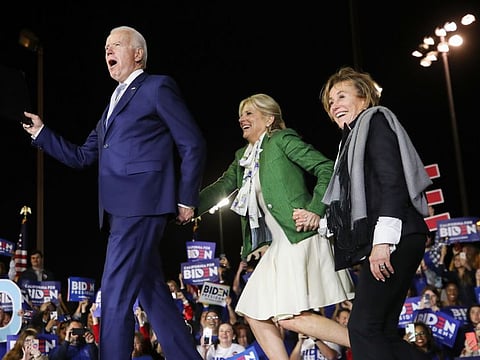Biden wins big on Super Tuesday. What does that mean?
Former US vice-president revitalises presidential bid with sweeping victories

Washington: Joe Biden scored sweeping victories on Super Tuesday, but his rival Bernie Sanders seized the biggest prize with a win in California, ensuring that the Democratic Party’s presidential race will now be a two-man contest.
Biden and Sanders, lifelong politicians with starkly different visions for America’s future, were battling for delegates as 14 states and one US territory held a series of high-stakes elections that marked the most significant day of voting in the party’s 2020 presidential nomination fight.
It’s all about numbers. The ultimate nominee must claim 1,991 delegates, which is a majority of the 3,979 pledged delegates available this primary season. Of these, 1,357 delegates were at stake on Super Tuesday. The campaign continues at an accelerated pace through the next two weeks, when nearly another 1,000 delegates are up for grabs, including the swing state of Florida on March 17.
Here’s a look at what happened and what lies ahead.
Who are the winners?
Biden is the frontrunner
Joe Biden, the former vice-president, won nine of 14 states voting on Super Tuesday, including surprise wins in Texas and Massachusetts. Just days after his campaign was resurrected by a thumping win in South Carolina, Biden, 77, emerged as a consensus champion for the moderate wing of the party against Sanders, 78, a left-wing senator with strong support among the youth.
People are talking about a revolution. We started a movementJoe Biden, Democratic presidential candidate
In what would be the day’s biggest upset, Biden was projected by Edison Research to have won Texas, the biggest prize after California. Biden, with overwhelming support from African-American, moderate and older voters, swept to wins in Alabama, Arkansas, Massachusetts, Minnesota, North Carolina, Oklahoma, Tennessee and Virginia.
Sanders trails
Sanders, the one-time front-runner who had hoped to take a big step toward the nomination on Tuesday, won Colorado, Utah and his home state of Vermont, Edison Research said. Fox News and AP projected Sanders won California, whose 415 delegates represent the largest haul. To date, Biden leads Sanders in delegates 385 to 325. A candidate needs 1,991 delegates to win the Democratic nomination on the first ballot at the party’s convention in July.
And losers?
Bloomberg, Warren lose
Michael Bloomberg, the billionaire former New York mayor who plunged into the contest late, won the tiny US territory of Samoa after spending half a billion dollars on advertising. He later dropped out of the race and endorsed Biden.
It was also a tough night for Senator Elizabeth Warren, who finished well behind Sanders and Biden in most states and trailed them in her home state Massachusetts, which Biden won despite having spent no money and deployed no staff there.
What helped Biden and Sanders win?
Biden’s victories were powered by Democratic voters who broke his way just days before casting their ballots. He was also helped by the departure of Pete Buttigieg and Amy Klobuchar who pulled out of the race at the last minute and endorsed Biden. He drew support from a broad coalition of moderates and conservatives, African Americans and voters older than 45, AP reported.
Sanders’ success proved he could deliver in perhaps the greatest test of his decades-long political career. His success was built on a base of energised liberals, young people and Latinos. But he was unable to sufficiently widen his appeal to older voters and college graduates who make up a sizable share of Democratic voters, according to AP VoteCast.
What happens next?
It could take weeks or months for the party to pick a candidate to take on President Donald Trump in the November general election. Candidates will try hard to win as many delegates as possible in the primaries over the next few months.
You cannot beat Trump with the same-old, same-old kind of politicsBernie Sanders, Democratic presidential candidate
The party’s top contender will be formally nominated at the Democratic National Convention, set for July 13-16 in Milwaukee, Wisconsin. If no candidate wins a majority-plus-one during the primary race, the pledged delegates become free to vote for another candidate on the convention’s second ballot. In addition, some 771 “super-delegates” - party committee officials and leaders, along with Democratic members of Congress - will be eligible to vote on the second ballot.
- with inputs from agencies





